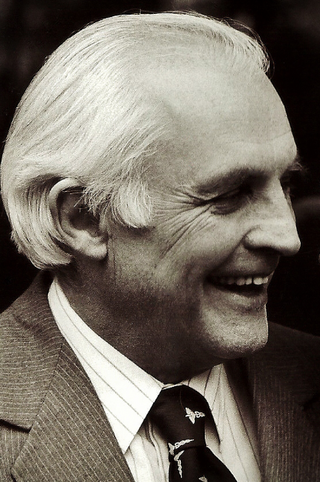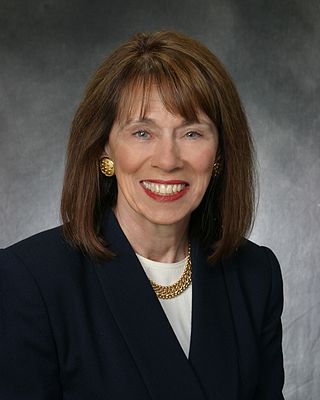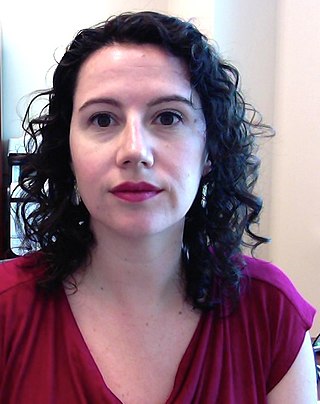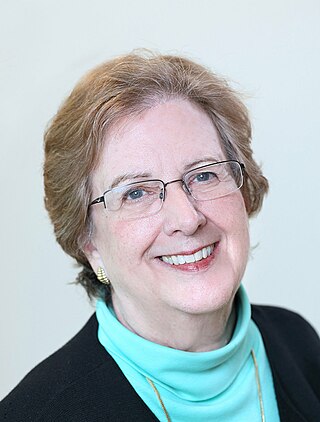
The National Institutes of Health, commonly referred to as NIH, is the primary agency of the United States government responsible for biomedical and public health research. It was founded in the late 1880s and is now part of the United States Department of Health and Human Services. Many NIH facilities are located in Bethesda, Maryland, and other nearby suburbs of the Washington metropolitan area, with other primary facilities in the Research Triangle Park in North Carolina and smaller satellite facilities located around the United States. The NIH conducts its own scientific research through the NIH Intramural Research Program (IRP) and provides major biomedical research funding to non-NIH research facilities through its Extramural Research Program.

The National Institute of Neurological Disorders and Stroke (NINDS) is a part of the U.S. National Institutes of Health (NIH). It conducts and funds research on brain and nervous system disorders and has a budget of just over US$2.03 billion. The mission of NINDS is "to reduce the burden of neurological disease—a burden borne by every age group, every segment of society, and people all over the world". NINDS has established two major branches for research: an extramural branch that funds studies outside the NIH, and an intramural branch that funds research inside the NIH. Most of NINDS' budget goes to fund extramural research. NINDS' basic science research focuses on studies of the fundamental biology of the brain and nervous system, genetics, neurodegeneration, learning and memory, motor control, brain repair, and synapses. NINDS also funds clinical research related to diseases and disorders of the brain and nervous system, e.g. AIDS, Alzheimer's disease, epilepsy, muscular dystrophy, multiple sclerosis, Parkinson's disease, spinal cord injury, stroke, and traumatic brain injury.
The National Center for Complementary and Integrative Health (NCCIH) is a United States government agency which explores complementary and alternative medicine (CAM). It was initially created in 1991 as the Office of Alternative Medicine (OAM), and renamed the National Center for Complementary and Alternative Medicine (NCCAM) before receiving its current name in 2014. NCCIH is one of the 27 institutes and centers that make up the National Institutes of Health (NIH) within the United States Department of Health and Human Services.
The National Institute of Mental Health (NIMH) is one of 27 institutes and centers that make up the National Institutes of Health (NIH). The NIH, in turn, is an agency of the United States Department of Health and Human Services and is the primary agency of the United States government responsible for biomedical and health-related research.

A neuroscientist is a scientist who has specialised knowledge in neuroscience, a branch of biology that deals with the physiology, biochemistry, psychology, anatomy and molecular biology of neurons, neural circuits, and glial cells and especially their behavioral, biological, and psychological aspect in health and disease.
Mind–body interventions (MBI) or mind-body training (MBT) are health and fitness interventions that are intended to work on a physical and mental level such as yoga, tai chi, and Pilates.

Gerald D. Fischbach is an American neuroscientist. He received his M.D. from the Weill Cornell Medical College of Cornell University in 1965 before beginning his research career at the National Institutes of Health in 1966, where his research focused on the mechanisms of neuromuscular junctions. After his tenure at the National Institutes of Health, Fischbach was a professor at Harvard University Medical School from 1972 to 1981 and from 1990 to 1998 and the Washington University School of Medicine from 1981 to 1990. In 1998, he was named the director of the National Institute of Neurological Disorders and Stroke before becoming the Vice President and Dean of the Health and Biomedical Sciences, the Dean of the Faculty of Medicine, and the Dean of the Faculty of Health Sciences at Columbia University from 2001 to 2006. Gerald Fischbach currently serves as the scientific director overseeing the Simons Foundation Autism Research Initiative. Throughout Fischbach's career, much of his research has focused on the formation and function of the neuromuscular junction, which stemmed from his innovative use of cell culture to study synaptic mechanisms.
Avindra "Avi" Nath, is a physician-scientist who specializes in neuroimmunology. Nath is a senior investigator, and intramural clinical director of the National Institute of Neurological Disorders and Stroke (NINDS) at the National Institutes of Health (NIH) in the United States. At NINDS, Nath also leads the Section of Infections of the Nervous System and plans to institute a translational research center. He previously served in several research and administrative positions at the Johns Hopkins Hospital and the Johns Hopkins University School of Medicine.

Dr. Ernst Freese was a molecular biologist who worked on the mechanism of mutations in DNA. From 1962 until his death he was Chief of the National Institute of Neurological Disorders and Stroke (NINDS) Laboratory of Molecular Biology at the National Institutes of Health (NIH). Ernst Freese's scientific career started in theoretical particle physics and later moved to molecular biology where he contributed to early genetics research.

Susan G. Amara is an American professor of neuroscience and is the Scientific Director of the National Institute of Mental Health. Dr. Amara is an elected member of the National Academy of Sciences and a fellow of the American Association for the Advancement of Science. She is a Past-President of the Society for Neuroscience. Dr. Amara has a B.S. in Biological Sciences from Stanford University and a Ph.D. in Physiology and Pharmacology from the University of California, San Diego.

Josephine P. Briggs is an American nephrologist and director emeritus of the National Center for Complementary and Integrative Health, an agency of the National Institutes of Health. She is currently the editor-in-chief of the Journal of the American Society of Nephrology.

Patricia A. Grady is an American neuroscientist internationally recognized for her research on stroke, which specializes in cerebral blood flow, metabolism, and function. She is director of the National Institute of Nursing Research (NINR), part of the National Institutes of Health (NIH) in Bethesda, Maryland. Grady was elected to the Institute of Medicine in 1999 and is a member of several scientific organizations, including the Society for Neuroscience and the American Academy of Nursing. She is a fellow of the American Stroke Association and the American Neurological Association.

Audrey Shields Penn is an American neurologist and emeritus professor. Her major area of research was in the biochemistry of muscle weakness in myasthenia gravis. Penn was elected President of the American Neurological Association in 1994. She was deputy director of the National Institute of Neurological Disorders and Stroke (NINDS), and is the first African-American woman to serve as an (acting) director of an Institute of the National Institutes of Health (NIH).
Mala Murthy is an American neuroscientist who serves as the Director of the Princeton Neuroscience Institute, and is the Karol and Marnie Marcin ’96 Professor of Neuroscience at Princeton University. Her work centers around how the brain extracts important information from the sensory world and utilises that information to modulate behavior in a social context. She is most known for her work in acoustic communication and song production in courting Drosophila fruit flies. Murthy and colleagues have also published an automated system for measuring animal pose in movies with one or more animal.

Carol Hanlon Pontzer was an American immunologist. She was a program director at the National Center for Complementary and Integrative Health. Pontzer was previously a professor of immunology at that University of Maryland, College Park.

Lauren Y. Atlas is an American psychologist researching how expectations and learning influence pain and emotion, and how these factors influence clinical outcomes. She is a clinical investigator at the National Center for Complementary and Integrative Health and serves as the chief of the section on affective neuroscience and pain.

Nina Felice Schor is an American physician-scientist and pediatric neurologist. She has served as director of the NIH Intramural Research Program since the Fall of 2022. Schor was the deputy director of National Institute of Neurological Disorders and Stroke from 2018 to 2022. She was the William H. Eilinger Chair of the Department of Pediatrics at University of Rochester and Pediatrician-in-Chief of the Golisano Children’s Hospital from 2006 to January 2018.

Judith Richmond Walters is an American neuropharmacologist serving as chief of the neurophysiological pharmacology section at the National Institute of Neurological Disorders and Stroke.

Karen Faith Berman is an American psychiatrist and physician-scientist who is a senior investigator and chief of the section on integrative neuroimaging, the psychosis and cognitive studies section, and the clinical and translational neuroscience branch of the National Institute of Mental Health's division of intramural research.

Heather A. Cameron is an American neuroscientist who researches adult neurogenesis and diseases involving the hippocampus. She is the chief of the neuroplasticity section at the National Institute of Mental Health.
















